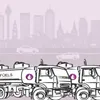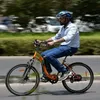Meet the diesel delivery startup powering Delhi Metro, L&T, Taj Hotels
Delhi-based startup Humsafar is cashing in on the rising demand for doorstep delivery of diesel after the lockdown. It has processed 8,000 transactions in four months.
Sanya Goel is a fourth-generation businesswoman in a family of oil traders, who have been in the sector since the 1960s. After earning a degree in entrepreneurship from the University of Warwick, she set up Samridhi Highway Solutions with her cousins in 2016.
The Delhi-based startup offered loyalty programmes for fuel purchases and partnered with fuel dealers and retailers. Customers could buy fuel at select outlets and earn points, which could then be redeemed while purchasing cars, bikes, etc.

Sanya Goel, Founder and Director, Humsafar
“We were bringing repeat purchases from customers, and rewarding them for patronising select petrol pumps,” Sanya tells YourStory.
In 2017, the Ministry of Petroleum & Natural Gas started contemplating the legalisation of doorstep delivery of diesel. Soon, it also roped in the Petroleum Explosives Safety Organisation (PESO) to draft guidelines to enable the process.
In January 2019, Samridhi ventured into tech-based fuel delivery with . “Through technology, we wanted to bring about disruptions that put convenience, safety, and cost-effectiveness at the heart [of fuel delivery],” Founder and Director Sanya explains.
However, Humsafar in its current form came about only this year as the demand for doorstep deliveries have increased since 2019. The app was launched by Labour Minister Santosh Gangwar in March 2020.
It allows apartment complexes, schools, hotels, hospitals, malls, construction sites, and bulk buyers of diesel in Delhi-NCR to place orders and get it delivered within eight hours. Minimum delivery is capped at 100 litres per order.

Humsafar's automated dispensing to delivery process
What Humsafar app solves
Doorstep diesel delivery by Humsafar solves three pain points: inadequate monitoring (issues of spillage and adulteration), storage infrastructure (huge spends for managing large inventories), and environmental hazards (unsafe transportation causing high carbon emissions).
Humsafar owns 12 PESO-compliant bowsers (oil tankers) with adequate safety protocols. The bowsers come in varying capacities of four to six kilolitres, and are handled by a dedicated team of bowser crews. Doorstep delivery also reduces congestion at fuelling stations and frees up roadways.
The app not only lets customers live track the delivery and get automated billing on completion of order, but it also ensures geo-fencing and automated digital dispensing. This means that the bowsers can be unlocked only with an OTP, which helps prevent adulteration and other illegal activities.

Humsafar app has crossed 5,000 downloads on Google Play Store
In less than four months, Humsafar has processed 8,000 transactions, and its app has crossed 5,000 downloads on Google Play Store. The startup has also roped in 30 retail partners across 12 states.
Humsafar prides itself on helping industries like agriculture and essential services run smoothly during the coronavirus lockdown.
Sanya shares, “We kept the lines open to vital industries ensuring that production is not disrupted. We delivered four lakh litres of diesel to 300 farmers [for their agricultural machinery] in Delhi-NCR to help them during the harvest season. We have also delivered diesel at construction and mining sites and helped them save a lot of costs.”
Business model and growth plans
At present, Humsafar has three revenue streams: the price of the door-delivered fuel paid by customers, transportation fees charged per order, and bowser fabrication services extended to some clients.
Additionally, the startup is also partnering with manufacturing and construction clients like Larsen & Toubro for fulfilling bulk diesel orders. Humsafar grossed revenues of Rs 22 million in 2019-20. It claims to have delivered 5.5 million litres of fuel valued at Rs 325 million during the year.
Besides L&T, its customers include the likes of Delhi Metro Rail Corporation, Taj Hotels, Ramky Infrastructure, Gawar Construction, and more.
In the current financial year, the startup looks to fill up bowsers from oil terminals directly in line with guidelines issued by the Ministry of Petroleum & Natural Gas.

Humsafar's PESO-certified bowsers
Sanya says, “Our dependence on petrol pumps for sourcing diesel would reduce and the negotiation strength would be enhanced significantly. It will also add to margins by way of additional earnings on account of transportation from terminals to customers.”
By the end of 2021, Humsafar is targeting diesel delivery of 500 million litres, leading to revenues of Rs 100 million. With additional channel partners for its bowser fabrication unit, the startup expects to add Rs 300 million more to its topline. It also wants to increase its bowser fleet to 500.
The 35-member strong startup also intends to become a pan India player. It has already set up offices in seven cities, including Mumbai, Bengaluru, Patna, Allahabad, Chandigarh, Jaipur, and Indore. The next line of offices will be coming up in Hyderabad, Trivandrum, Ahmedabad, and Guwahati shortly.
Humsafar is also looking to raise its first external investment, and plans to launch B2C ordering by the end of 2020.

Humsafar has roped in 30 fuel retail partners
Market landscape and diesel price hike
Oil and gas is one of India’s largest legacy industries, and is ripe for disruption. Hence, startups like Humsafar, which combine oil retail expertise with frictionless tech and UX, have a wide market to tap into.
India’s daily diesel consumption forecast for 2020 is 4.73 million barrels, as per industry estimates. There are approximately 64,000 fuel retail outlets, which process 3.5 crore daily transactions.
Further, India's oil demand growth has “recovered strongly” since 2018, where major inconveniences were caused by the government’s new GST infrastructure, according to energy research consultancy Wood Mackenzie.
In 2019, India contributed 14 percent to the global growth in oil demand, and is now poised to become the world’s second-largest “oil demand centre” after China. “Transport fuels – gasoline and diesel – and residential LPG will continue to be the two main drivers of oil demand growth,” Wood Mackenzie stated in a 2019 report.

Humsafar team
However, all projections could take a hit given the massive hike in the price of diesel, which for the first time, is costlier than petrol.
Diesel prices have now gone up by 22 times in the last three weeks, taking the total increase to Rs 11.14 per litre. Delhi, which is central to Humsafar’s operations, is the worst-hit market with one litre of diesel costing Rs 80.43. Sanya, however, downplays the impact of the price rise on Humsafar.
She says,
“Doorstep delivery of diesel has boomed during COVID-19 because people don’t want to venture out and expose themselves. Sectors like agriculture and ecommerce are booming, and we see demand from them. Our clients are mainly in the construction and manufacturing sector, which will continue to buy diesel in bulk.”
Humsafar’s biggest competitors are Bengaluru-based MyPetrolPump, Noida-based Pepfuels, and Pune-based Repos Energy.
But there’s enough opportunity for co-existence given India’s annual fuel consumption is pegged at over 85 billion litres. Diesel delivery startups are just getting started.
Edited by Saheli Sen Gupta










